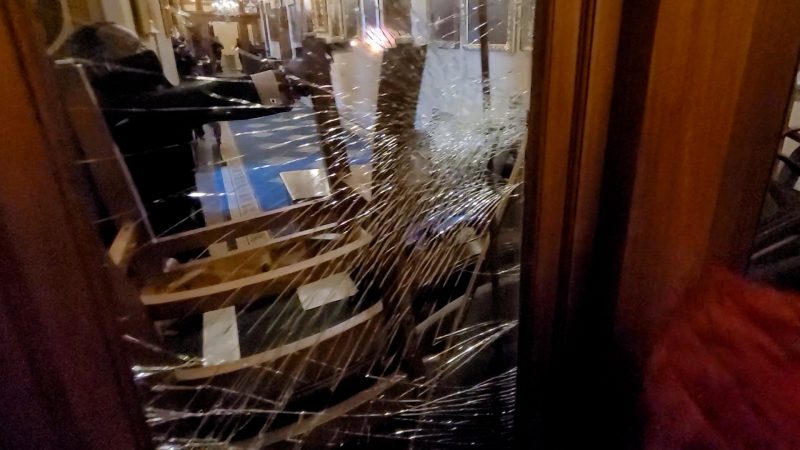A Kentucky man who was part of a mob smashing windows to the House Speaker’s Lobby in the Capitol on Jan. 6, which led to Ashli Babbitt trying to climb through before being fatally shot by police, was convicted Thursday of two felonies and seven misdemeanors, including obstruction of an official proceeding and destruction of government property.
Chad Barrett Jones, 45, of Mount Washington, Ky., was captured on video as part of a group of Donald Trump supporters cursing U.S. Capitol Police officers who were standing outside the glass doors to the Speaker’s Lobby while members of Congress were preparing to evacuate as rioters neared. Behind the glass were chairs and tables, and also an armed Capitol Police lieutenant, Michael Byrd.
Jones, in a red coat and gray knit cap, and others were punching and striking the glass panels. The three Capitol Police officers are seen in the video walking away from the doors as an armed tactical squad approaches from behind. The mob began slamming the glass with fists and hard objects, and Jones was accused of hitting one panel at least 10 times.
As another panel collapsed, Babbitt is seen in the video climbing up into the frame through the broken glass, and was then fatally shot by Byrd. Byrd was cleared of any criminal charges by the Justice Department.
A family member who saw Jones on a news program reported him to the FBI on Jan. 8, 2021, according to court records. The family member told agents that Jones wanted to explain “why it all was happening and why it was a hoax.”
Jones was arrested on Jan. 16, 2021, and later indicted on nine counts, five of them felonies. Instead of a jury trial, he chose a bench trial before Senior U.S. District Judge Richard J. Leon, who was handling his first Jan. 6 case.
During the four-day trial last week, Leon granted a motion by defense attorney William C. Brennan Jr. to strike the words “deadly and dangerous weapon” from three counts, lowering them from felonies to misdemeanors. Leon ruled that the wooden flagpole was not inherently dangerous, and that “even when he [Jones] was being pushed out of the Capitol by officers, he never used it as a weapon.”
Although that decision lowered Jones’s possible sentencing range on those counts, Leon still found Jones guilty of the felonies obstruction of an official proceeding, with a maximum possible sentence of 20 years, and impeding police during a civil disorder. No judge has imposed the maximum sentence on a Jan. 6 defendant for obstruction of an official proceeding. The longest sentence imposed on a Jan. 6 defendant was 18 years, which was given to Oath Keepers founder Stewart Rhodes and included many other charges in addition to obstruction.
“He knew Congress was meeting,” Leon said of Jones. “His attempting to break down a window outside the House chamber impeded the House certification” of the electoral vote.
Jones’s sentencing is set for Nov. 8.








